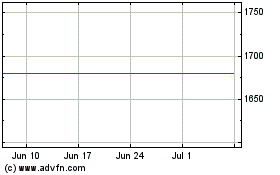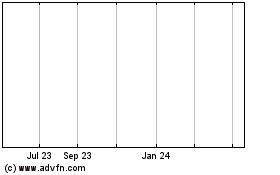By Benoit Faucon and Sune Engel Rasmussen
Asian companies that had provided a lifeline to Iran after the
U.S. reimposed sanctions last year are pulling back, hurting the
hobbled Iranian economy and leaving the Islamic Republic with less
incentive to stay committed to a multination nuclear deal, Western
diplomats say.
The companies are reacting to the Trump administration's moves
this month to squeeze Iran's oil exports and impose a terror
designation on its paramilitary force. Among Asian businesses
rethinking their dealings with Iran are banks, oil companies and
technology giants including Huawei Technologies Co., Lenovo Group,
LG Electronics Inc. and Samsung Electronics Co.
Many deals between Iran and Chinese companies "are now dead in
the water, " said an adviser to a Chinese oil company in Iran. "No
one wants to take the risk of going out of business."
Last year, the Trump administration pulled out of the 2015
agreement that lifted sanctions on Iran in exchange for tightened
control on its nuclear program.
Tehran pinned its hopes on China and other Asian nations when
European companies began withdrawing from its economy ahead of the
U.S.'s reinstatement of sanctions last fall. During the earlier
sanctions period before the nuclear agreement's approval, China
overtook Europe as Iran's chief supplier of industrial
equipment.
But this week, Iran's main means of payment -- the direct
exchange of oil for goods and services -- came under abrupt threat
when the U.S. State Department said it would end waivers for all
buyers of Iranian oil.
The move means any company importing oil from Iran after the
current round of waivers expires on May 2 could be blocked from the
American banking system.
Until now, Washington had allowed eight jurisdictions, including
China, India and South Korea, to purchase Iranian oil as long as
they committed to reducing their imports.
The Trump administration's tightening of the ban came two weeks
after Washington raised the risks for companies doing business with
Iran by designating the Islamic Revolutionary Guard Corps a
terrorist organization. The Guard Corps plays a significant role in
Iran's economy, including its energy industry.
The reaction from buyers of Iranian oil has been mixed. India
has said it would likely abide by the U.S. rules but China's
foreign ministry has taken a defiant tone, saying Beijing
"consistently opposes U.S. unilateral sanctions."
Experts expect that China will continue to buy some Iranian oil,
but many Chinese businesses are limiting their exposure to the
country. Bank of Kunlun Co., a key conduit for Sino-Iranian trade,
told clients on Monday that it will stop all transfers with Iran
beginning May 1, said Mostafa Pakzad, a Tehran-based consultant who
helps companies carry payments in and out of Iran.
The bank, owned by state-run China National Petroleum Corp., had
already interrupted such dealings last year but had restarted trade
of humanitarian goods in the hope they could be exchanged for Iran
oil.
Monthly Chinese exports to Iran stood at $629 million in March,
down from a monthly average of $1.6 billion from 2014 to early
2018, according to China's General Administration of Customs.
The prospect of reduced oil imports from Iran -- along with
rising U.S. pressure -- has led to a more concerted scaleback from
China in recent weeks.
Late last month, Pang Sen, the Chinese ambassador to Iran, and
other diplomats met with Iranian business people in Tehran,
including consumer electronics distributors. The message, according
to Iranian business people briefed on the gatherings: China has no
plan to increase its exposure to Iran.
China Foreign Ministry spokesman Geng Shuang said he wasn't
aware of the ambassador's conversations but said "the normal
cooperation between China and Iran must be respected and
protected."
Multibillion-dollar projects in oil and gas fields and railways
granted to Chinese state-run giants are now under threat, according
to Iranian business executives and the Chinese oil-company
adviser.
Also in March, Huawei, the world's second-largest smartphone
maker, laid off most of its 250 staff in Iran, according to
businessmen in Tehran. And Beijing-based Lenovo, the world's
largest computer manufacturer, banned its Dubai-based distributors
from selling to Iran after a warning from the U.S. Treasury
Department, these people said.
A Lenovo spokeswoman said the company has a firm policy of
complying with export regulations but declined to comment further.
A Treasury spokesman declined to comment.
Huawei has come under heavy pressure from Washington -- which
alleges the company violated international banking sanctions on
Iran -- and the dispute has turned into a major point of contention
between the Trump administration and Beijing.
South Korean consumer-electronics giants Samsung and LG already
have reduced exposure to Iran and are consulting with government
officials in Seoul to determine whether they must withdraw from the
nation entirely following the end of U.S. oil waivers, according to
business people in Tehran who work with the companies.
Iran had been financing purchases from both companies with funds
generated from the sale of oil and crude-based products.
A Samsung spokesman said he couldn't immediately comment. Huawei
and LG didn't respond to requests for comment.
European officials say Beijing has appeared willing to slow
trade with Iran in return for concessions from Washington in the
continuing trade fight between the U.S. and China. Beijing has been
locked in a dispute with the Trump administration over bilateral
commercial tariffs and intellectual property.
"The Chinese are very committed" to the Iranian nuclear deal in
principle, said one senior European diplomat. "But their
overarching objective is of course their relationship on trade with
the U.S."
--Shan Li, Kersten Zhang and Dominique Fong in Beijing and
Laurence Norman in Belgium contributed to this article.
Write to Benoit Faucon at benoit.faucon@wsj.com, Sune Engel
Rasmussen at sune.rasmussen@wsj.com and Laurence Norman at
laurence.norman@wsj.com
(END) Dow Jones Newswires
April 24, 2019 15:41 ET (19:41 GMT)
Copyright (c) 2019 Dow Jones & Company, Inc.
Samsung Electronics (PK) (USOTC:SSNHZ)
Historical Stock Chart
From Mar 2024 to Apr 2024

Samsung Electronics (PK) (USOTC:SSNHZ)
Historical Stock Chart
From Apr 2023 to Apr 2024
